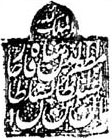Muzaffar al-Din Shah
| Mozaffar ad-Din Shah Qajar | |||||
|---|---|---|---|---|---|
Shahanshah of Persia |
|||||
 |
|||||
| Shah of Iran | |||||
| Reign | 1 May 1896 – 3 January 1907 | ||||
| Predecessor | Naser al-Din Shah Qajar | ||||
| Successor | Mohammad Ali Shah Qajar | ||||
| Born |
23 March 1853 Tehran, Iran |
||||
| Died | 3 January 1907 (aged 53) Tehran, Iran |
||||
| Issue | See below | ||||
|
|||||
| Dynasty | Qajar | ||||
| Father | Naser al-Din Shah | ||||
| Mother | Shokuh-ol-Saltaneh | ||||
| Religion | Shia Islam | ||||
| Tughra |  |
||||
| Full name | |
|---|---|
| Mozaffar ad-Din Shah Qajar |
Mozaffar ad-Din Shah Qajar, (Persian: مظفرالدین شاه قاجار, Mozaffar Ŝāh-e Qājār, Muẓaffari’d-Dīn Shāh Qājār; 23 March 1853 – 3 January 1907) was the fifth Qajar king of Persia (Iran). He reigned between the years 1896 and 1907.
He is credited with the creation of the Persian constitution, and often wrongly credited with the rise of the Persian Constitutional Revolution which took place immediately after his death.
The son of the Qajar ruler Naser al-Din Shah Qajar, Mozaffar ad-Din was named crown prince and sent as governor to the northern province of Azerbaijan in 1861. He spent his 35 years as crown prince in the pursuit of pleasure; his relations with his father were frequently strained, and he was not consulted in important matters of state. Thus, when he ascended the throne in May 1896, he was unprepared for the burdens of office.
At Mozaffar ad-Din's accession Persia faced a financial crisis, with annual governmental expenditures far in excess of revenues due to the policies of his father. During his reign, Mozzafar ad-Din attempted some reforms of the central treasury; however, the previous debt incurred by the Qajar court, owed to both England and Russia, significantly undermined this effort. He furthered this debt by borrowing even more funds from Britain, France, and Russia. The income from these later loans was used to pay earlier loans rather than create new economic developments. In 1908, oil was discovered in Persia but Mozzaffar ad-Din had already awarded William Knox D'Arcy, a British subject, the rights to oil in most of the country in 1901.
Like his father he visited Europe three times. During these periods, on the encouragements of his chancellor Amin-os-Soltan, he borrowed money from Nicholas II of Russia to pay for his extravagant traveling expenses. During his first visit he was introduced to the "cinematographe" in Paris, France. Immediately falling in love with the silver screen the Shah ordered his personal photographer to acquire all the equipment and knowledge needed to bring the moving picture to Persia, thus starting Persian cinema. The following is a translated excerpt from the Shah's diary:
...
Wikipedia
